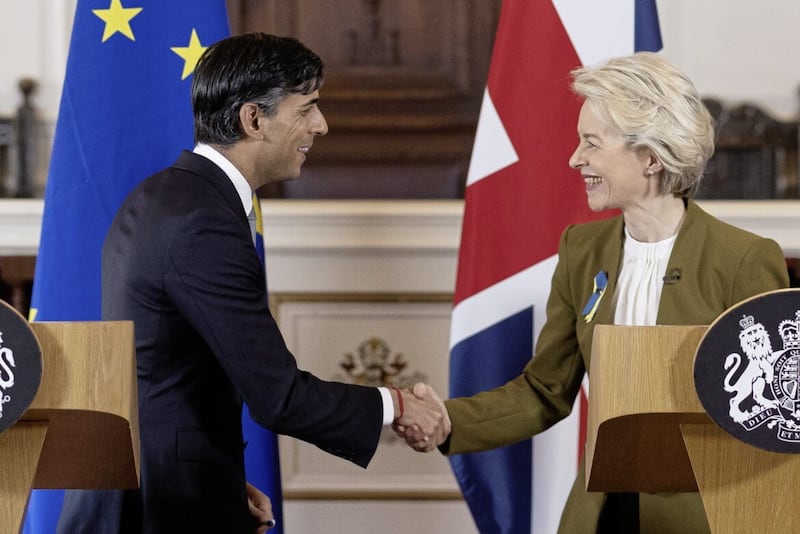It looks as if the divided DUP – and their fiercest critics, the TUV – are going to work themselves up into a froth again about the Irish Sea border that they, and their treacherous former friend Johnson, created in October 2019.
In December, probably December 17, MLAs have to vote on keeping the north in the EU’s single market. They will.
The vote will be carried easily, the combined unionist parties going down something like 53-36 to the combined Sinn Féin, Alliance, SDLP and the single PBP vote.
♦ Subscriber Exclusive: Q&A with columnist Tom Kelly
What unionists don’t understand is of how little consequence the whole pantomime is. It doesn’t amount to a row of Italian beans coming in through the border post at Larne.
As usual, everyone but the DUP has moved on. Furthermore, and this is a change the DUP haven’t come to terms with yet, the privileged position they enjoyed with the wholly partisan Conservative government over the past 14 years has gone.
The DUP have no leverage in Westminster. In a vast sea of Labour MPs – 411 – the surviving five DUP MPs don’t count. They’re easily forgotten.

That seems to have been the case when allocating places on the Northern Ireland Affairs Committee last week. Finding a place for a unionist looked like an afterthought – “an administrative error” was the explanation before the DUP leader was squeezed in.
However, the main point is that in the DUP’s straitened circumstances, they will no longer be able to be the tail wagging the dog.
The whole paraphernalia around the so-called ‘democratic consent vote’ in December was caused by Johnson pandering to DUP threats to vote against him in his headlong rush ‘to get Brexit done’. As soon as he swept in with his large majority in December 2019, the DUP were thrown under a red London bus made in Ballymena.
Leo Varadkar made the concession when he met Johnson in Liverpool in October 2019. He didn’t have to – international trade agreements are reserved matters and of no concern to devolved administrations – but Johnson needed something to placate the DUP. So Varadkar, against the advice of some of his officials, agreed to a Stormont vote but, cunningly, only as long as it was by simple majority.
He knew full well that the pro-EU support in Sinn Féin, Alliance and the SDLP would carry the day. As for Johnson, he didn’t care because we know he didn’t intend to abide by the deal he struck with the EU anyway.
However, Starmer’s government does intend to operate all aspects of the Trade & Cooperation Agreement, as the Labour manifesto promised. It specifically mentioned the Windsor Framework.

Now, in case you don’t know, the Windsor Framework is the Irish Protocol with its operation slightly streamlined. The EU is content if the British want to call it the Windsor Framework, but it’s the protocol and it will remain.
The October 2019 deal stipulated that since the vote in December will be a simple majority, the British are obliged to review the workings of their Windsor Framework, but everyone knows the review will amount to nothing.
No-one in Starmer’s government wants to cause any hassle with the EU. In fact the reverse is the case.
Ever so slowly and cautiously, they want to move closer to the EU, first by negotiating a sanitary and phyto-sanitary agreement to reduce checks on EU-UK trade and, eventually, though they currently deny this, trying to work towards a Swiss-style arrangement with the single market.
Working in that direction is fundamental for the development of the British economy. Here’s why. The huge tax increases (£40 billion) announced in the budget and the vast UK debt are all necessary to try to compensate for the 5% loss in UK GDP caused by Brexit.
That 5% amounts to around £100 billion missing from the British economy – the cost of Brexit – accurately forecast by City economists and set to last until at least 2029.
The only way to recoup some of that loss is to find a way to shadow the single market like Switzerland and Norway, but there’s no chance of that happening any time soon. EU negotiations are interminable and the British electorate has to see some benefits before the next election.
All of this means that the December vote in Stormont is of no significance whatsoever.
Yes, it will allow the DUP and TUV to throw mud at each other and for unionists to engage in a biblical bout of weeping and wailing and gnashing of teeth. None of that matters to anyone else.
Once again, unionists will fail to draw the conclusion that when it comes to Britain advancing its own interests, unionists don’t amount to a row of those Italian beans crossing the Irish Sea border.




